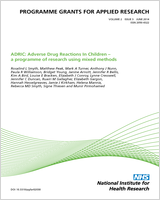NCBI Bookshelf. A service of the National Library of Medicine, National Institutes of Health.
Colver A, Rapley T, Parr JR, et al. Facilitating the transition of young people with long-term conditions through health services from childhood to adulthood: the Transition research programme. Southampton (UK): NIHR Journals Library; 2019 May. (Programme Grants for Applied Research, No. 7.4.)

Facilitating the transition of young people with long-term conditions through health services from childhood to adulthood: the Transition research programme.
Show detailsAddressing objective 1: to work with young people with long-term conditions to determine what successful transition means to them and what is important in their transitional health care
We determined that engaging UP in a research study co-led by them would help them better understand research processes and generate knowledge important to the programme. UP chose ‘health passports’ as the focus of their work. These are usually a portable means of recording health information.46,47
Aim
- To explore the usefulness of health passports in a project co-led by UP.
Methods
UP examined a range of passports designed to help young people navigate health services and concluded that there was no clear definition of what a ‘health passport’ was. As there were many health passports already available, UP decided that it would not be useful to develop another one. However, as no robust analysis of health passport use has been undertaken, UP aimed to examine the use and usefulness of some health passports already used by young people with long-term conditions.
UP contacted health-care professionals from a children’s hospital, a physical disabilities team, an adolescent rheumatology team and a voluntary organisation. UP asked professionals about their experience of health passports and this helped to identify questions and issues to explore with young people, such as:
- What kind of passports are used and what are their essential components?
- Who uses health passports and who benefits from them?
- How are they used and how are young people supported to use them?
UP then worked with the patient satisfaction team in the lead trust to devise a questionnaire to assess the views of young people about health passports. Then the professionals in the above organisations helped UP link to young people who used health passports. However, this proved difficult as ethics and research governance permissions were required; it was impossible to achieve this across several organisations within the available time.
Analysis
Young people from one service returned questionnaires (n = 13) and, although the response rate was low (20%), interesting findings emerged. None of the 13 participants said that they completed the health passport alone; the majority said that they thought passports were ‘useful’, but half of them never took them to health-care appointments. The passports were considered more useful to health professionals than to young people themselves.
Strengths and limitations
This work identified some qualitative findings about health passports. However, the work did not generate, as intended, enough quantitative data from which to draw definitive conclusions. It was difficult to obtain all of the research governance permissions in a timely manner to enable UP to approach as many young people as they had intended. The approaches also depended on the willingness and time of local health professionals to approach young people. For other parts of the programme, all such preliminary contacts and undertakings had been formalised before the programme started. For this work, co-generated by UP, planning could not begin until UP had worked through its ideas, which was at least 1 year into the programme.
Such challenges have been reported before. A Dutch group undertook participatory research with young people with chronic illness48 and concluded that, although the activity benefited the young people, it was an inefficient and unreliable way to gather research data. Similar benefits to young people were reported in a study in Vancouver.49
Key findings
- There is a lack of conceptual clarity and no clear definition about what is meant by ‘health passport’.
- The work raises questions about whether or not a health passport is a tool truly held by young people. Who should complete it and when? Do young people really want it to ‘travel’ with them to appointments and between services?
Inter-relationship with other parts of the programme
This WP contributed directly to the longitudinal study WP 2.1. A health passport was discussed as a candidate PBF of transitional health care. However, the initial work that UP undertook indicated that ‘health passport’ meant different things to different people, and although it was considered useful by some professionals, young people appeared to value it much less. We therefore decided not to include health passport as a PBF. This decision was vindicated by the subsequent survey work that UP undertook.
The confidence that members of UP gained by carrying out their research and their greater appreciation of research methodology enhanced the quality of all of their contributions to the programme, which were set out in the earlier account of WP 1.1. It also increased their self-confidence, and this is discussed in Involvement of patients, the voluntary sector and the public and in our associated published paper.45
UP presented the health passport work at the Department of Health and Social Care’s ‘Takeover Day’, where interest was expressed in taking the passport work forward nationally.
UP presented their work as a poster at several meetings, including the final dissemination meeting at The King’s Fund, London, in October 2017. UP’s poster presentation is in Appendix 4.
- Work package 1.2: health passport - Facilitating the transition of young people ...Work package 1.2: health passport - Facilitating the transition of young people with long-term conditions through health services from childhood to adulthood: the Transition research programme
Your browsing activity is empty.
Activity recording is turned off.
See more...